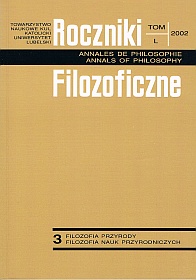The Origin of Human Life: Does the Human Zygote Have the Status of a Person?
Abstract
The above question can be answered briefly: the human zygote is a person, for man is a person. Thus formulated question is not a question that is asked by the biologist who does research on the origins of human life. Its answer is involved in the philosophical debate on the very concept of person. Here we deal with two separate scientific disciplines: philosophy (philosophical anthropology, to be precise) and biology (especially embryology). The discussion on the status of the human zygote demands respect for the competencies of either science. Otherwise, we might neutralize the concept of person, or demand of the biologist (as a biologist) to transcend the empirical character of his discipline towards philosophical abstraction. Let us add that the concept of person functions also in theology and law.
Therefore the question about the personal status of the human zygote transcends the competencies of biology. The biologist, precisely speaking embryologist, will not dwell on the anthropological disputes about the concept of the human person. Rather, he will ask whether the human zygote is a man, that is a representative of the homo sapiens species, according to generic category. Respectively, we have two questions referring to the same zygote, or the primary stadium of our human existence: the questions about its human and personal status. Do they in fact concern the same, or we are dealing here with two, equal dimensions of human existence? The large number of answers given today to the question about the status of the zygote and successive developmental stages of man arouse doubts as to the unambiguous status of the zygote. One thing is certain in this discussion: we were all zygotes in the beginning. The way to answer them is, as it seems, first to make the concept of person more accurate, and then to answer how for we can refer this concept to the human zygote.
References
Bartel H.: Embriologia, Warszawa: PZWL 1995.
Bedate C. A., Cefalo R. C.: The Zygote: To Be or Not Be a Person, „The Journal of Medicine and Philosophy”, 14(1989) 641-654.
Blumenfeld J. B.: Abortion and the Human Brain, „Philosophical Studies”, 32(1977) 251-268.
Boethius: Contra Eutychen et Nestorium, cap. 3, 74.
Breuer C.: Person von Anfang an? Der Mensch aus der Retorte und die Frage nach dem Beginn des menschlichen Lebens, Paderborn−München−Wien− Zürich: Ferdinand Schöningh 1995.
Coté G. B., Gyftodinou J.: Twinning and Mitotic Crossing-over: Some Possibilities and Their Implications, „American Journal of Human Genetics”, 41(1991) 120-130.
DiosVialCorrea J. de: Embrion ludzki jako organizm i jako ktoś pośród nas, [w:] Medycyna i prawo: za czy przeciw życiu?, red. E. Sgreccia, T. Styczeń, J. Gula, C. Ritter, Lublin: RW KUL 1999, s. 58-66.
Feinberg J.: The Rights of Animals and Unborn Generations, [w:] Contemporary Issues in Bioethics, ed. T. L. Beauchamp, L. Walters, Belmont, Ca.: Wadsworth Publishing Company 1982(3), s. 154-161.
Fletcher J.: Indicators of Humanhood: A Tentative Profile of Man, „Hastings Center Report”, 2(1972) 1-4.
Harris J.: The Value of Life: An Introduction to Medical Ethics, London−New York 1985.
Johnson M.: Delayed Hominization. Reflections on Some Recent Catholic Claims for Delayed Hominization, „Theological Studies”, 56(1995) 743-763.
Krąpiec A.: Ja − człowiek, (Dzieła, IX), Lublin: RW KUL 19915.
Lockwood M.: When Does Life Begin?, [w:] Contemporary Issues in Bioethics, ed. T. L. Beauchamp, L. Childress, Belmont: Wadsworth Publishing Company 1982(3), s. 136-141.
Rodziński A.: Osoba i kultura. Warszawa: ODiSS 1985.
Sancti ThomaeAquinatis: Summa Theologica, Romae 1984.
Seifert J.: „Hirntod”. Ein Beitrag zur Kritik der philosophischen Korrumpierung der medizinischen Technik, [w:] Ethik und Technik. Das Bild vom Menschen, wie ist es heute, wie soll es werden, hrsg. von E. Kull, Zürich 1989, s. 183-199.
Serra A., Colombo R.: Identity and Status of the Human Embryo: The Contribution of Biology, [w:] Identity and Statute of Human Embryo. Proceedings of Third Assembly of the Pontifical Academy for Life (Vatican City, February 14-16, 1997), ed. J. de Dios Vial Correa, E. Sgreccia, Libreria Editrice Vaticana 1998, s. 128-177.
Singer P.: Practical Ethics, Cambridge: Cambridge University Press 1997.
Spaemann R.: Personen. Versuche über den Unterschied zwischen „etwas” und „jemand”, Stuttgart: Klett-Cotta 1996.
Steinbock B.: Life Before Birth: The Moral and Legal Status of Embryos and Fetuses, New York−Oxford: Oxford University Press 1992.
Sutton A.: Arguments for Abortion of Abnormal Fetuses and the Moral Status of the Developing Embryo, „Ethics and Medicine: An International Perspective on Bioethics”, 6(1990) 5-10.
Tooley M.: Abortion and Infanticide, Oxford: Clarendon Press 1983.
Warren M. A.: On the Moral and Legal Status of Abortion, „The Monist”, 57(1973) 43-61.
Copyright (c) 2002 Roczniki Filozoficzne

This work is licensed under a Creative Commons Attribution-NonCommercial-NoDerivatives 4.0 International License.





